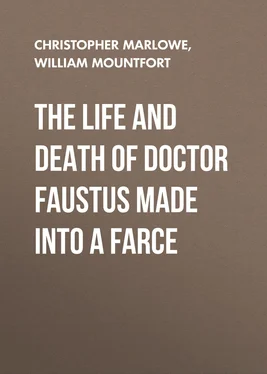"Dr. Faustus" is a highly competent putting-together of those components which the experienced actor-playwright knew to be surefire. The date of its premier production is not known and has been assigned to a date as early as 1684 and as late as 1688. The farce was not published until the quarto of 1697, which appeared without cast-list, prologue, or epilogue. 8 8 The first edition, page 5, omits the period at the end of 1. 23 and the speech prefix "Meph." for 1. 24. These are correctly added in the second edition (1720).
The title page, however, states that the farce was acted at Dorset Garden "several times," by "Lee" (Anthony Leigh) and Jevon, and, as the editor of The London Stage points out, since Jevon died in December of 1688, the premiere was probably no later than the season of 1687-1688. 9 9 The London Stage 1660-1800, Part I: 1660-1700 , ed. W. Van Lennep (Carbondale, Ill.: Southern Illinois University Press, 1965), 342.
Borgman maintains that "Dr. Faustus" is Mountfort's second work, after The Injured Lovers of February, 1688, noting that the epilogue to that play, spoken by Jevon, suggests that Mountfort was planning, or had written, a farce:
Pardon but this, and I will pawn my life,
His next shall match my Devil of a Wife,
We'll grace it with the Imbellishment of Song and Dance;
We'll have the Monsieur once again from France,
With's Hoop and Glasses, and when that is done,
He shall divert you with his Riggadoon.
We might guess, then, that if the epilogue does refer to "Dr. Faustus," the date of that play is as late as the Spring of 1688.
Mountfort took as his raw material Marlowe's great tragedy and for that reason "Dr. Faustus" may be to some extent thought of as a burlesque. The Restoration audience delighted in Marlowe's Faustus; the Elizabethan tragedy had been played in 1662, and there was a performance at the Duke's Theater in September, 1675. Edward Phillips wrote in his Theatrum Poetarum , that "of all that [Marlowe] hath written to the Stage his Dr. Faustus hath made the greatest noise with its Devils and such like Tragical sport." 10 10 (London, 1675), p. 25.
Here lies the suggestion that Mountfort was to take up, for as Borgman notes, Marlowe's tragedy has two distinct lines: the mighty verse which makes up the tragedy of an heroic overreacher, and a comic line of farcical lazzi
Конец ознакомительного фрагмента.
Текст предоставлен ООО «ЛитРес».
Прочитайте эту книгу целиком, купив полную легальную версию на ЛитРес.
Безопасно оплатить книгу можно банковской картой Visa, MasterCard, Maestro, со счета мобильного телефона, с платежного терминала, в салоне МТС или Связной, через PayPal, WebMoney, Яндекс.Деньги, QIWI Кошелек, бонусными картами или другим удобным Вам способом.
Six Plays, written by Mr. Mountfort (London, 1720), 2 volumes. All references to plays other than "Dr. Faustus" are taken from this collection.
The substance of my account of Mountfort's life and work is based on Albert S. Borgman, The Life and Death of William Mountfort (Cambridge: Harvard University Press, 1935).
An Apology for the Life of Colley Cibber , ed. B. R. S. Fone (Ann Arbor: University of Michigan Press, 1968), p. 117.
Charles Gildon, The Lives and Characters of the English Dramatick Poets (London, [1698?]), p. 102.
(London, 1702), p. 17.
Essays of John Dryden , ed. W. P. Ker (New York: Russell & Russell, 1900; rpt. 1961), I, 135-136.
English Literature of the Late Seventeenth Century (Oxford: Clarendon Press, 1969), p. 132.
The first edition, page 5, omits the period at the end of 1. 23 and the speech prefix "Meph." for 1. 24. These are correctly added in the second edition (1720).
The London Stage 1660-1800, Part I: 1660-1700 , ed. W. Van Lennep (Carbondale, Ill.: Southern Illinois University Press, 1965), 342.
(London, 1675), p. 25.












